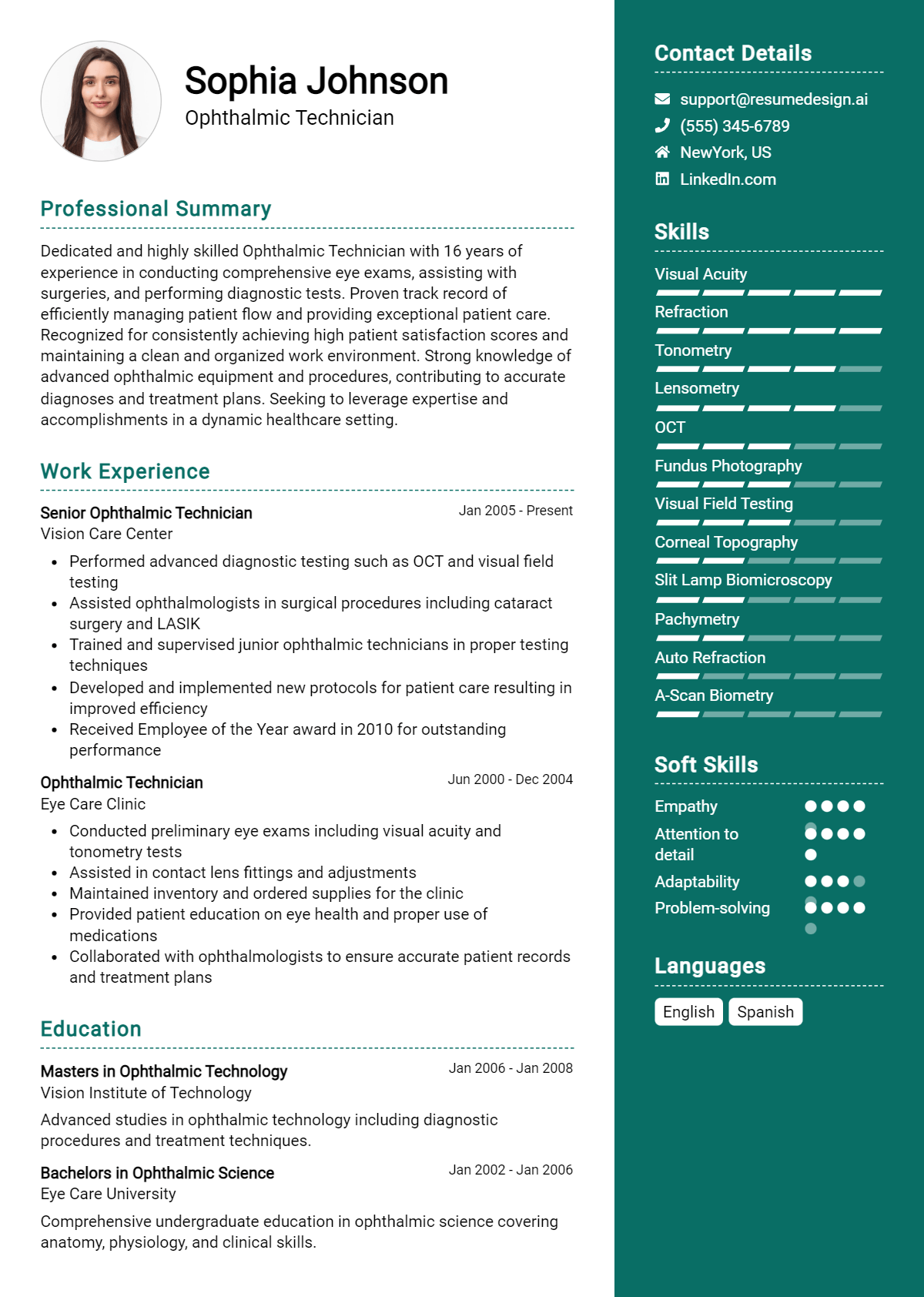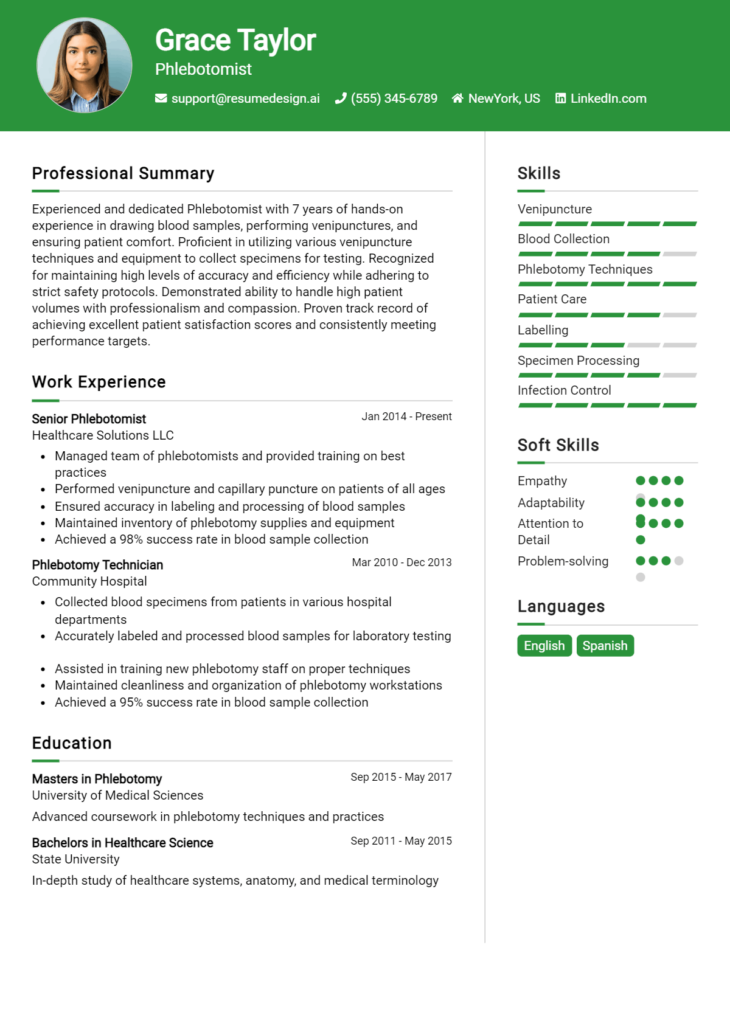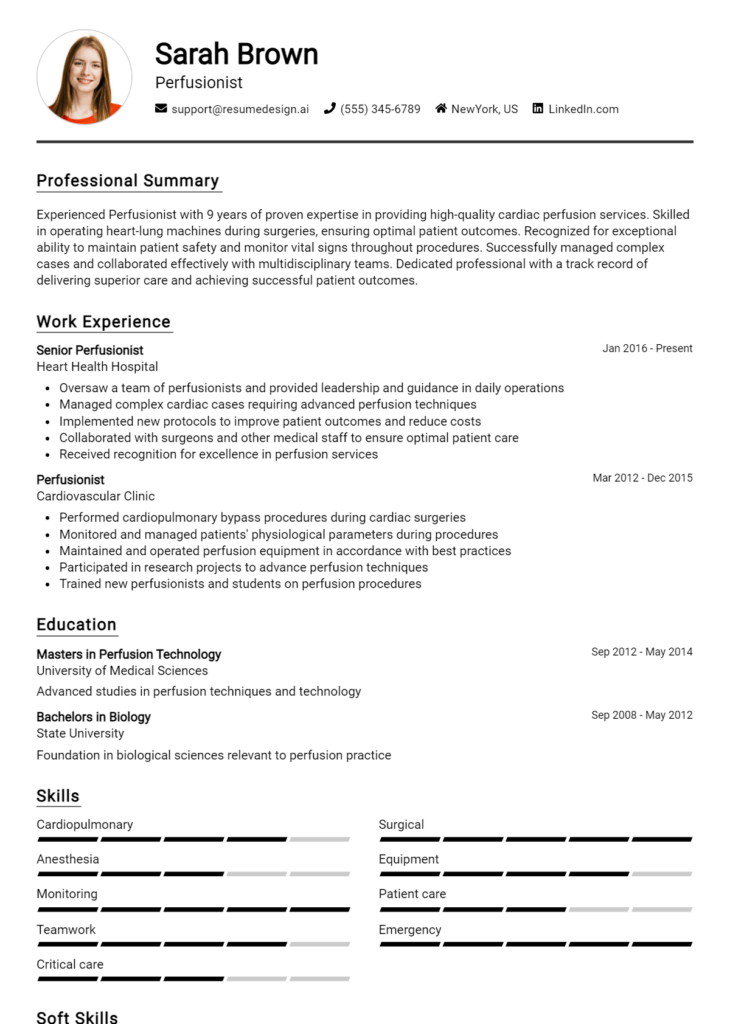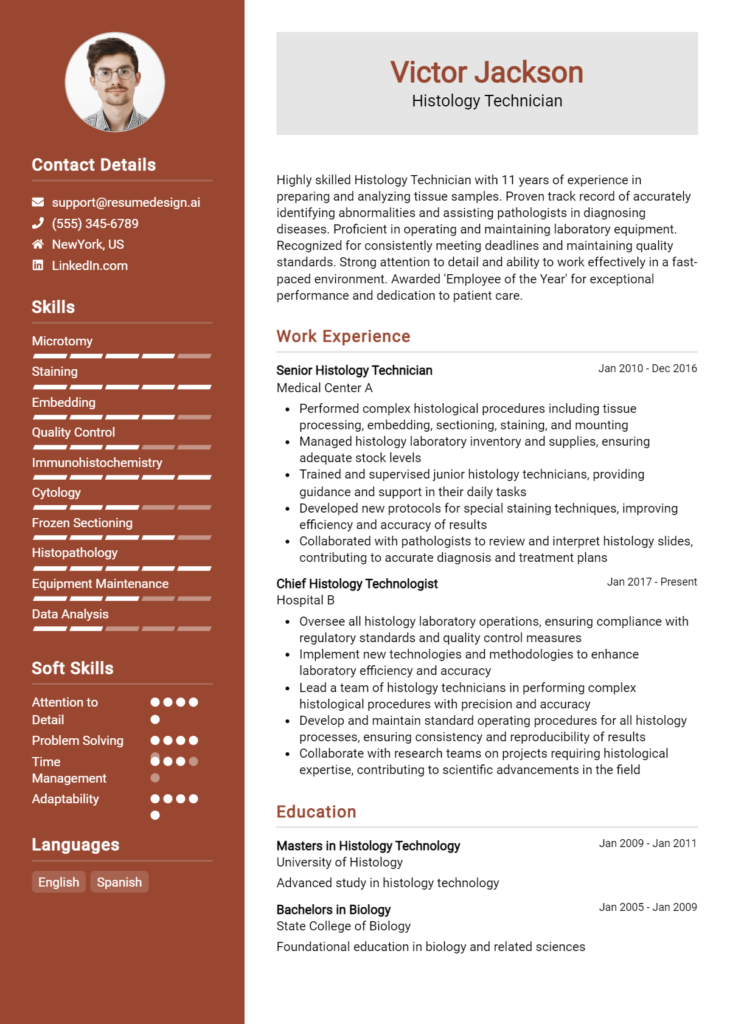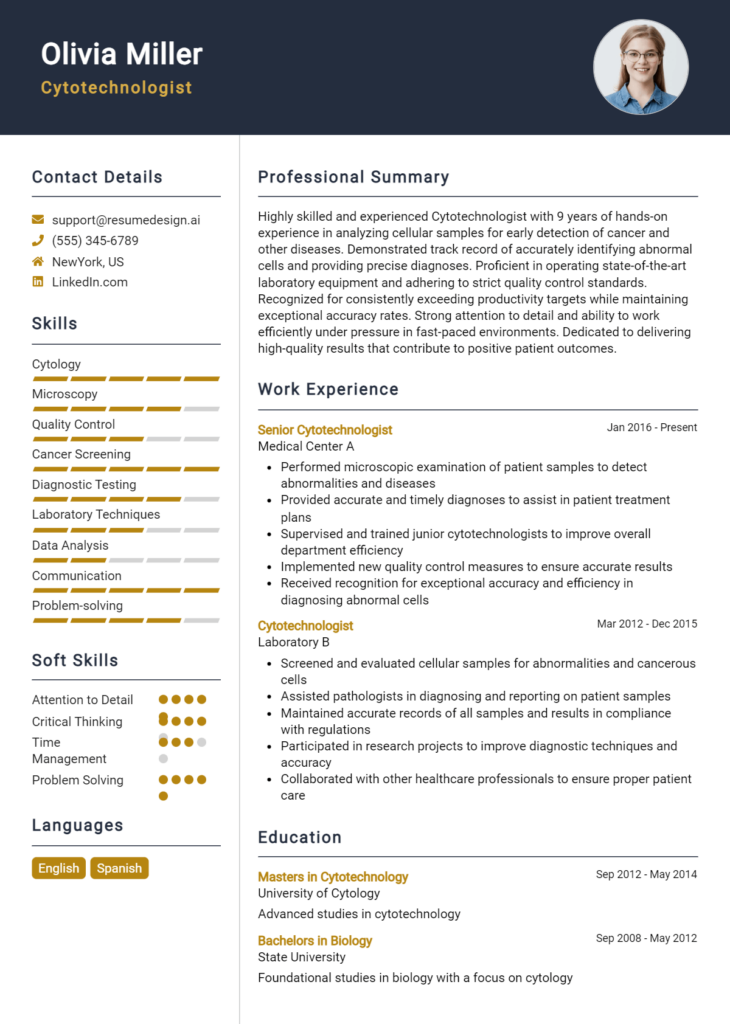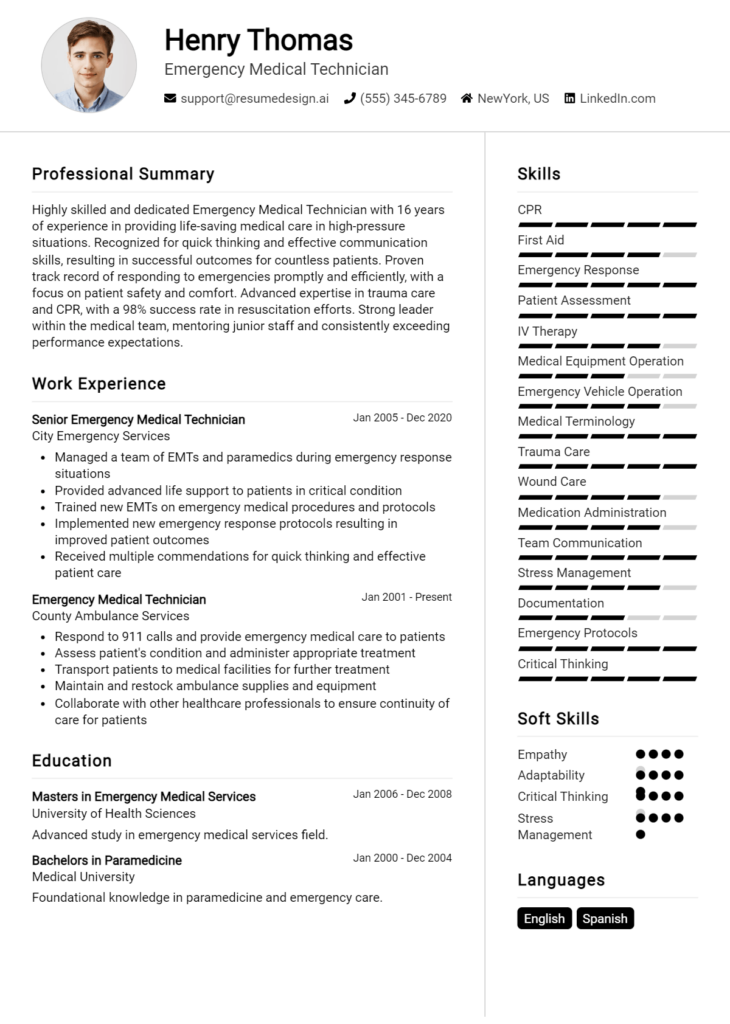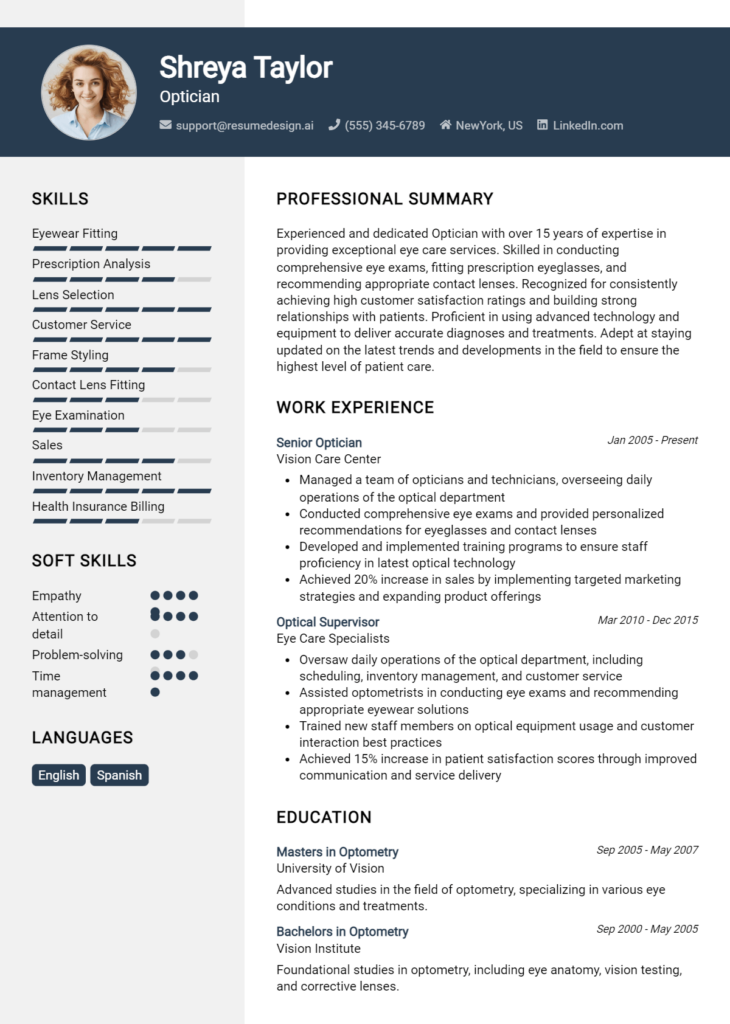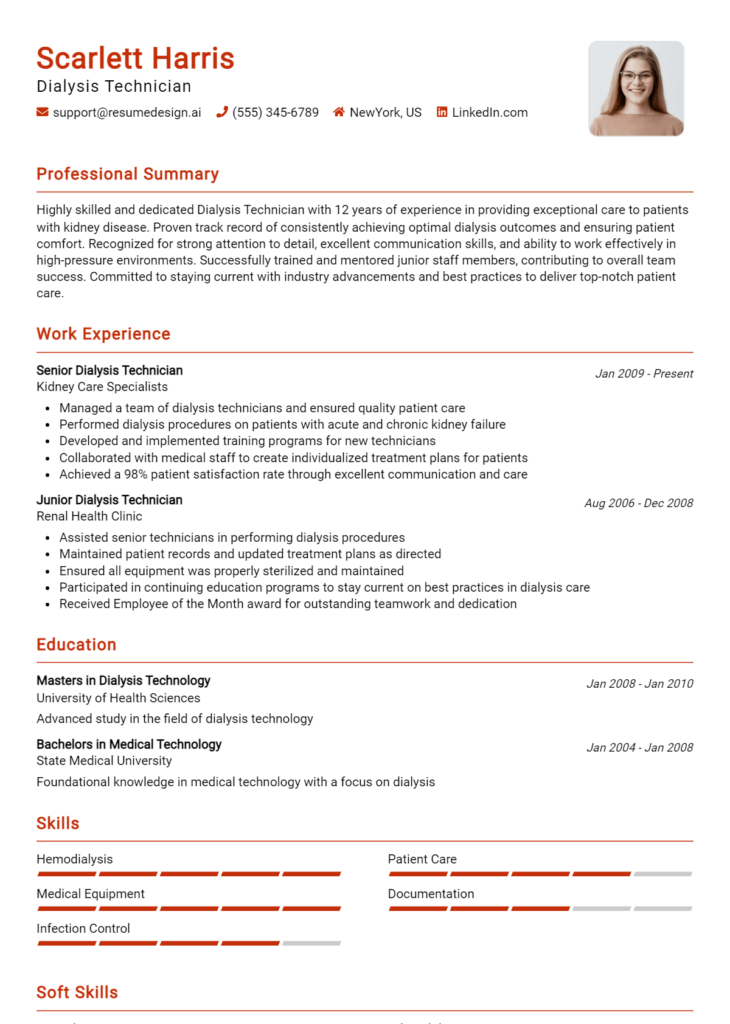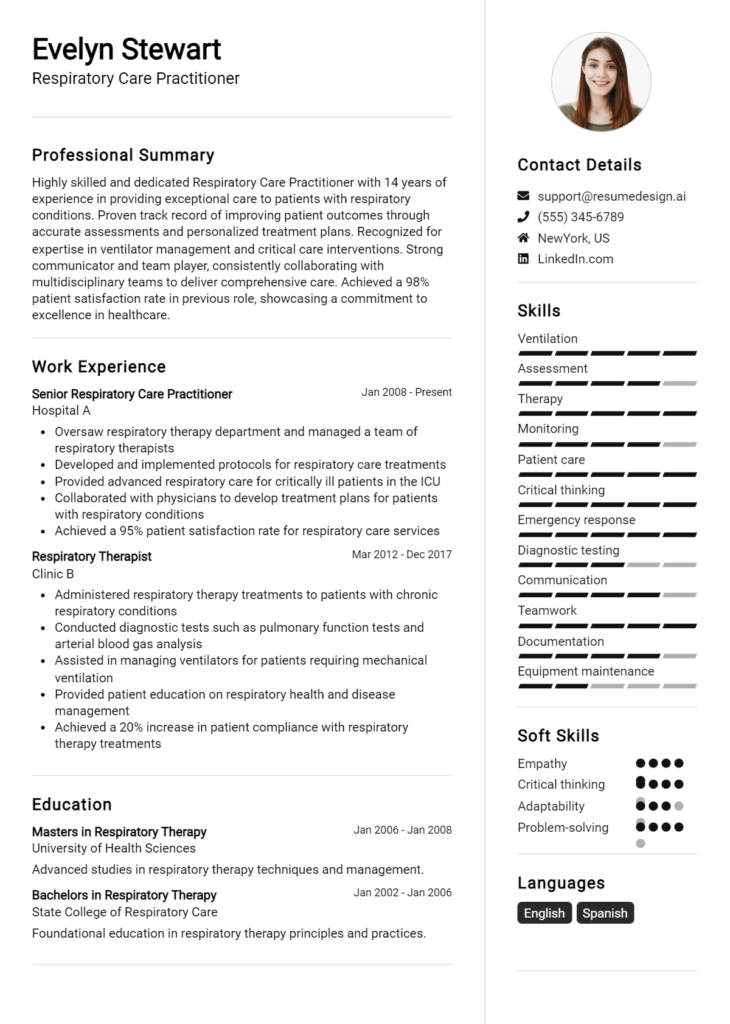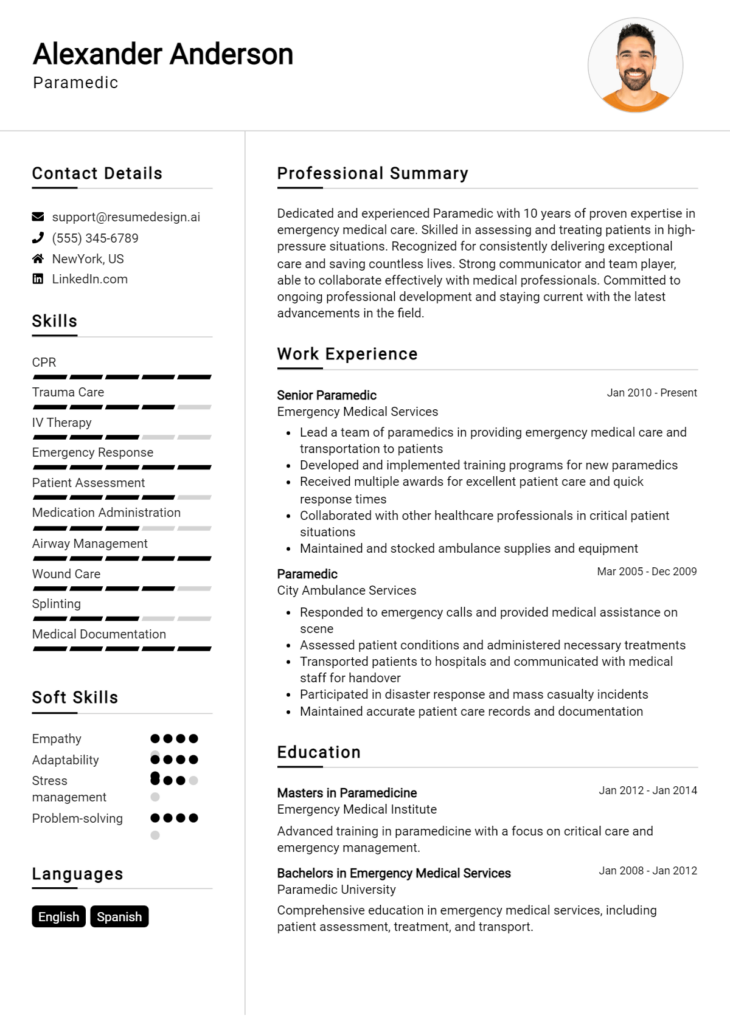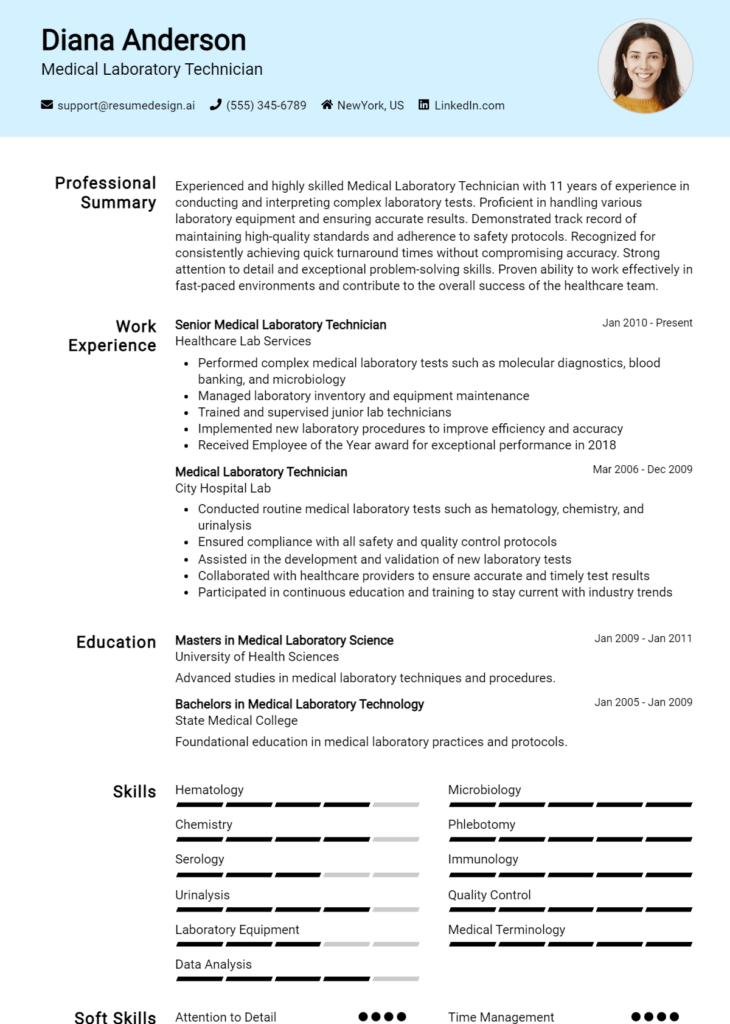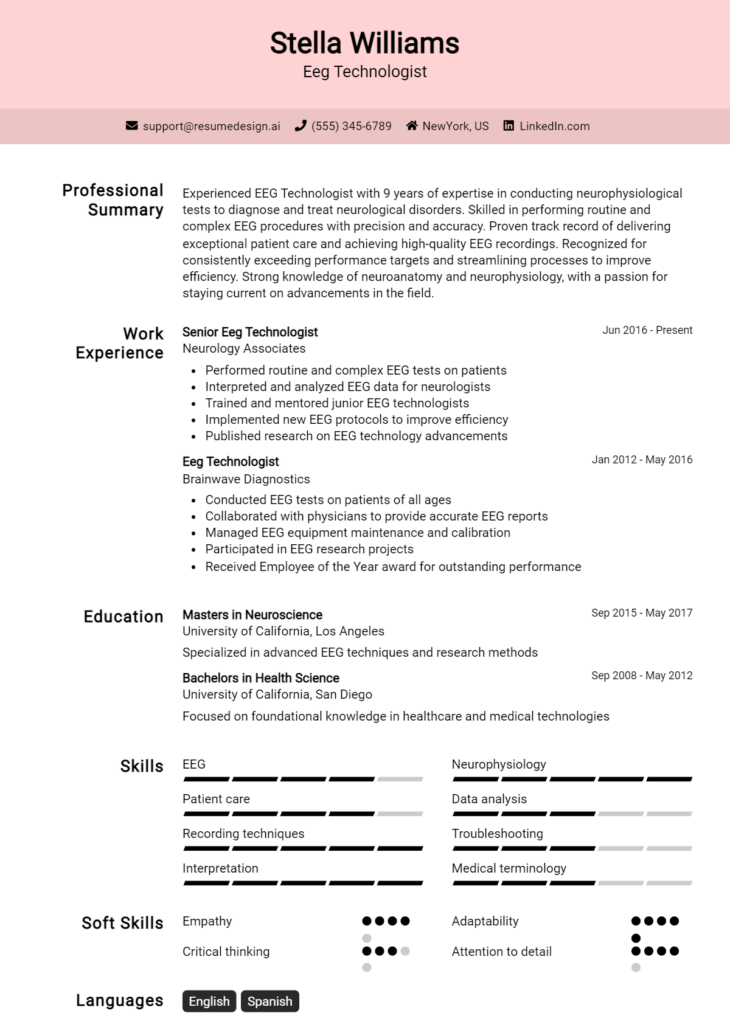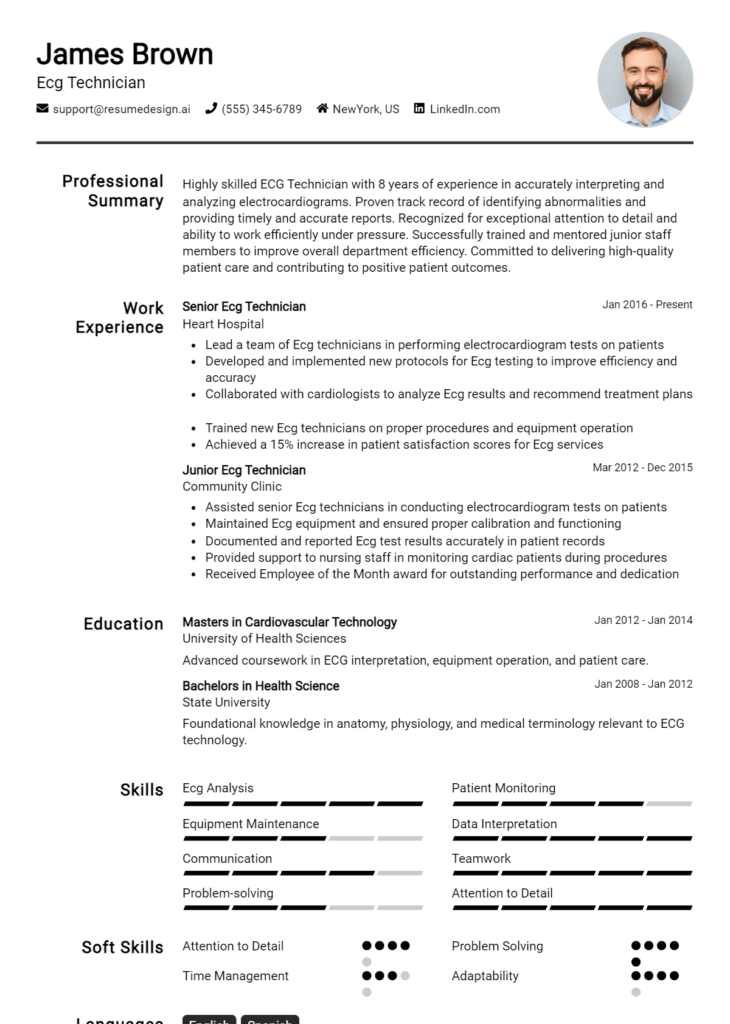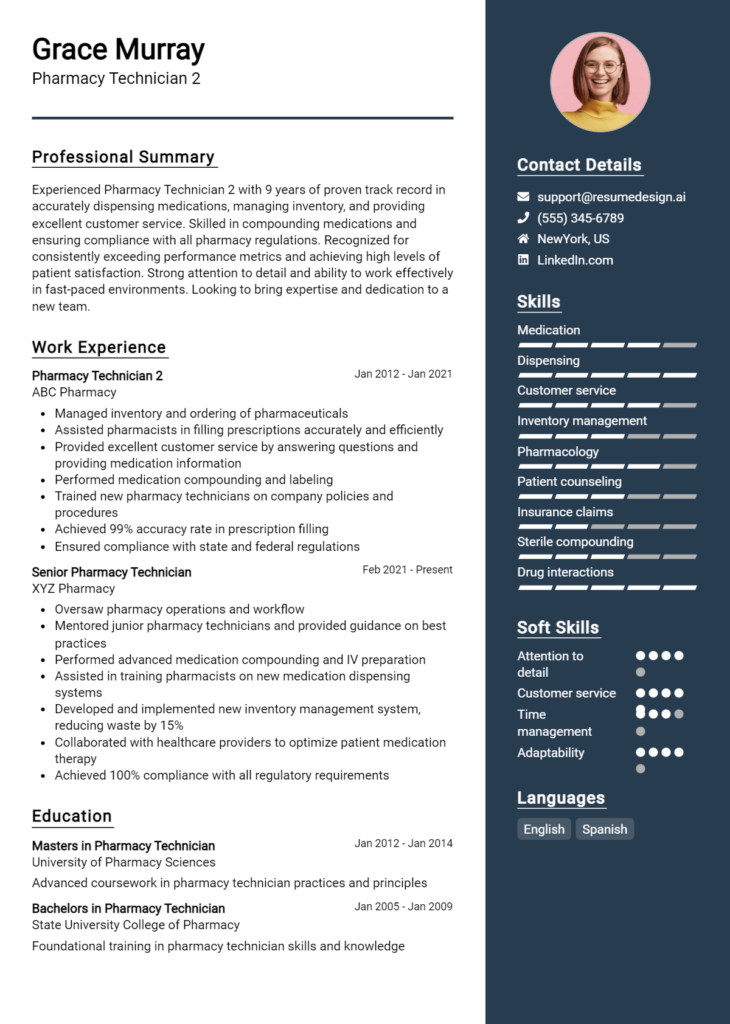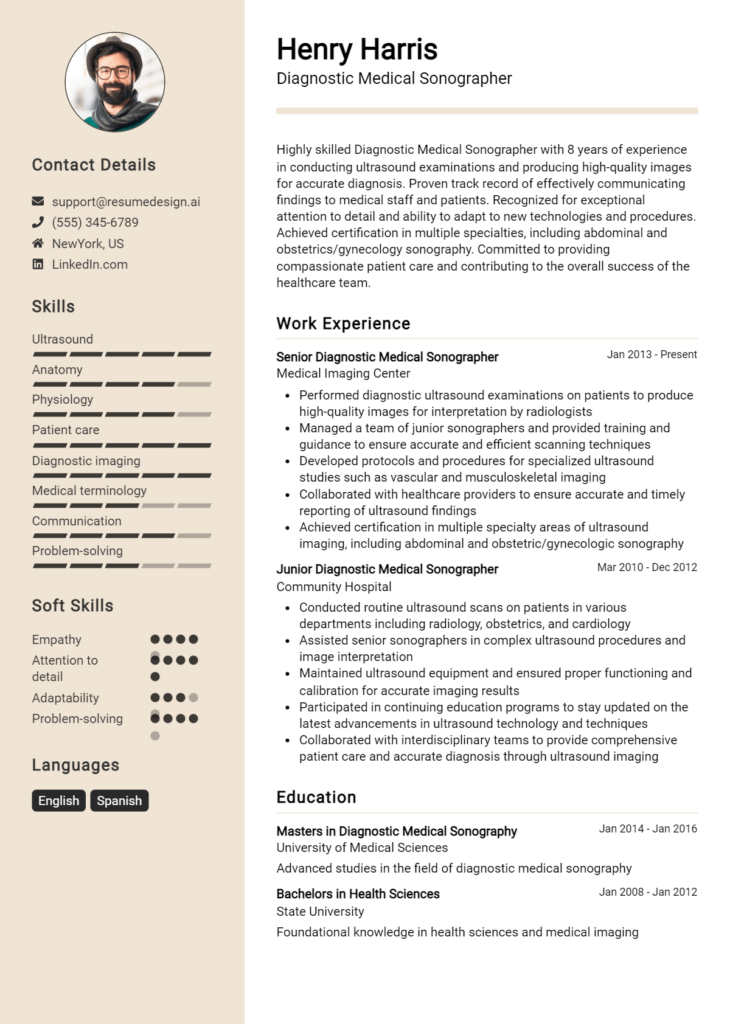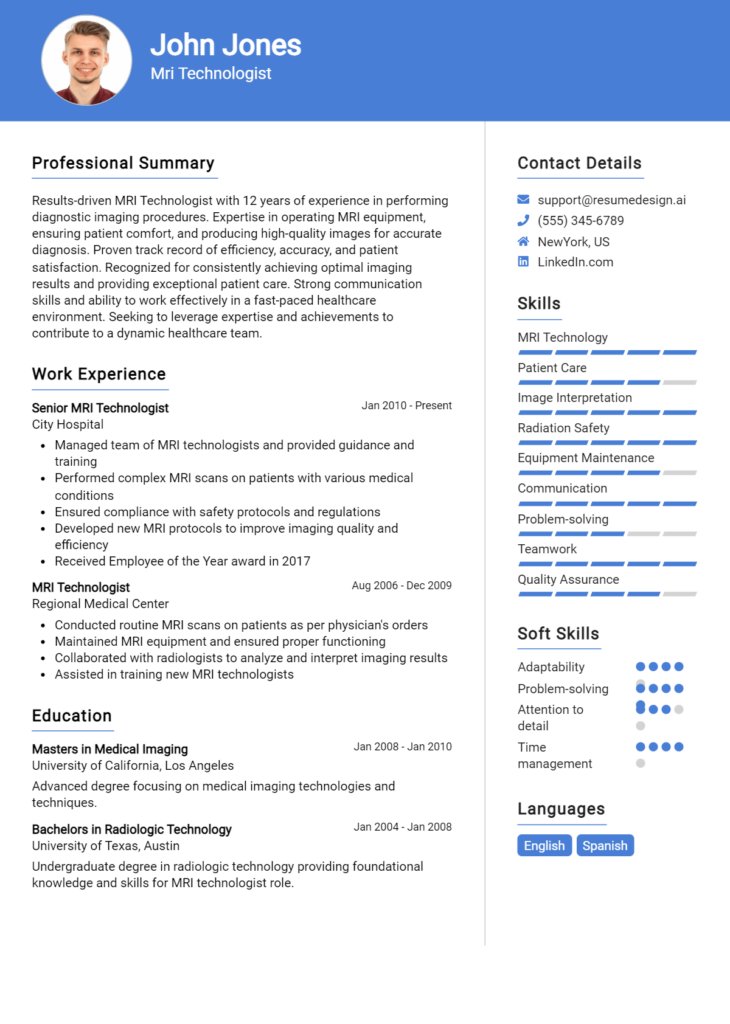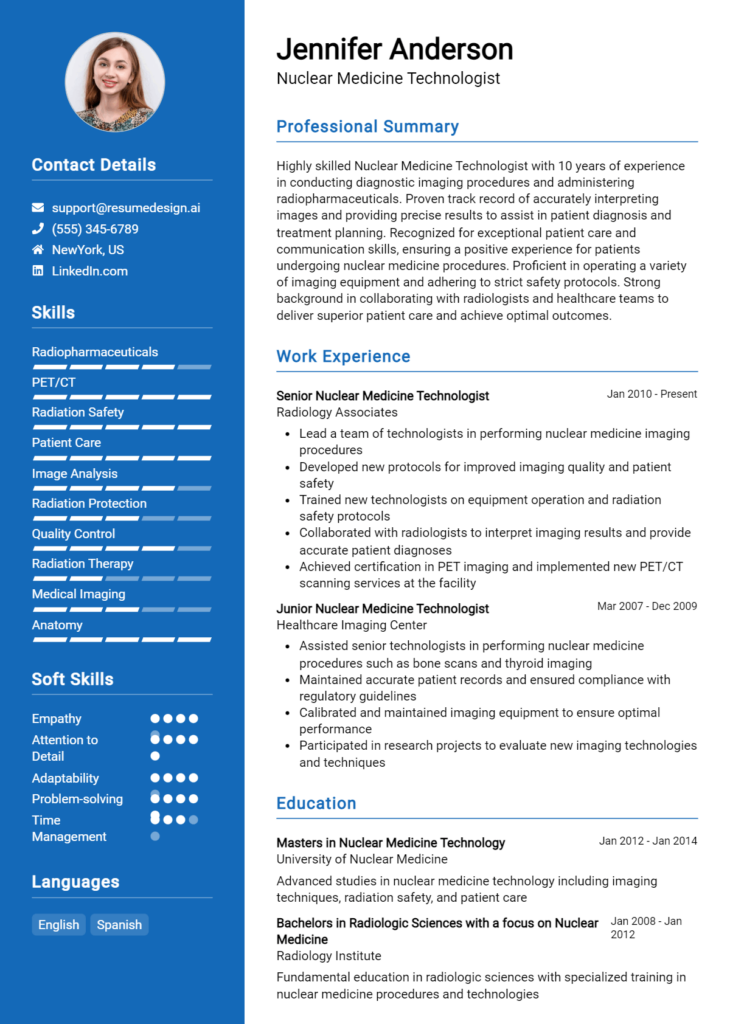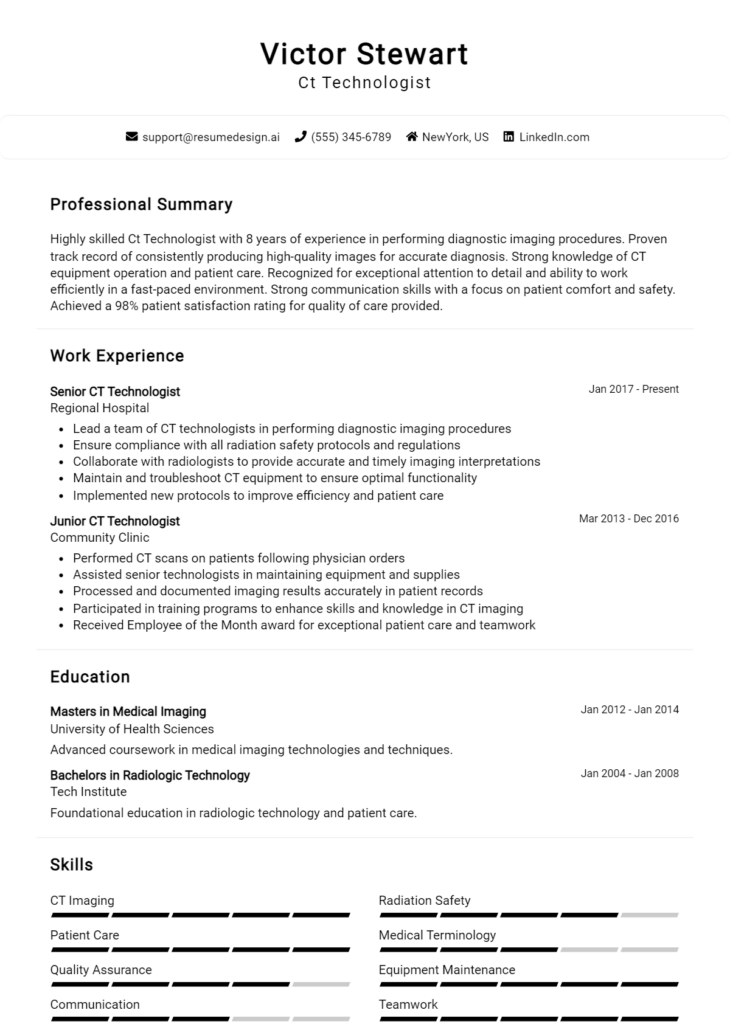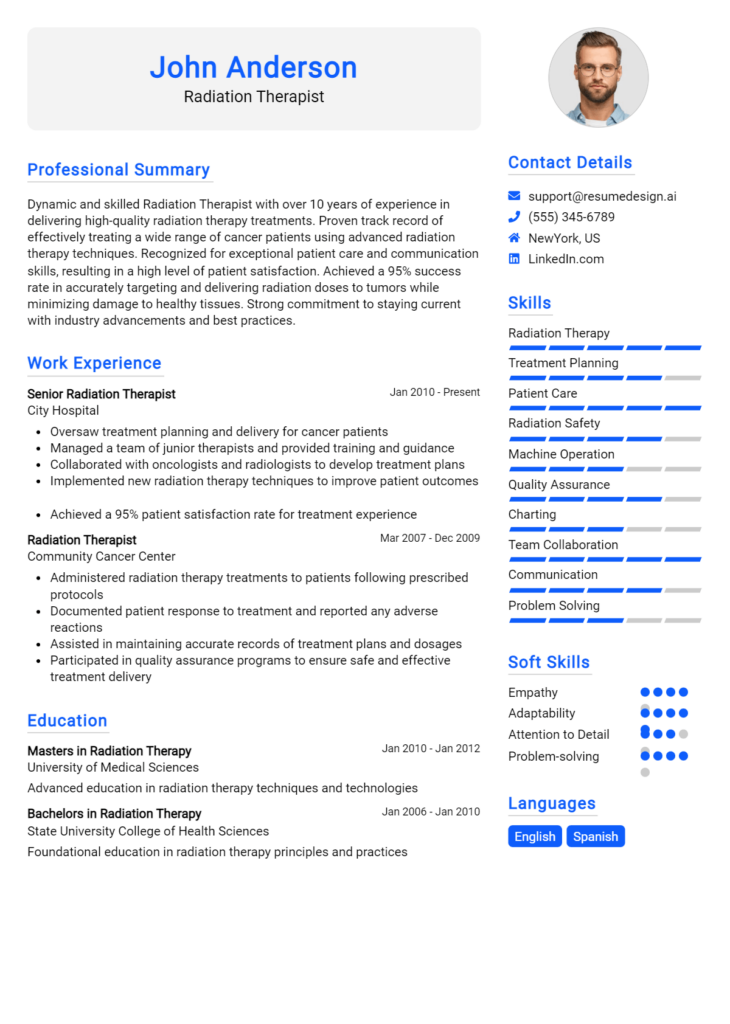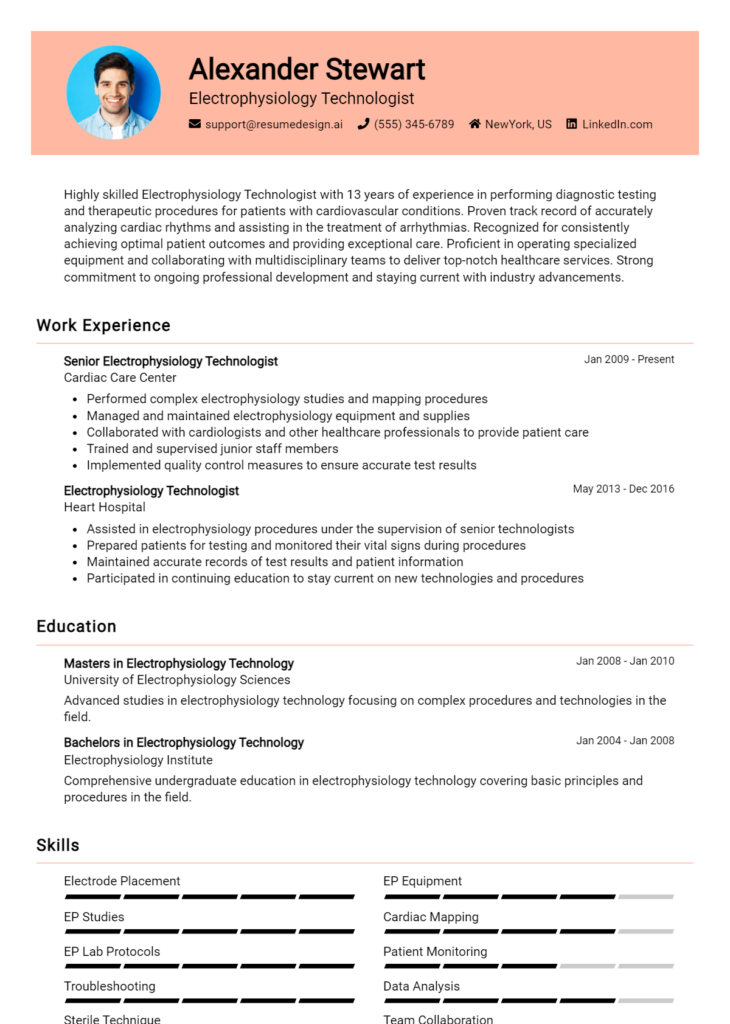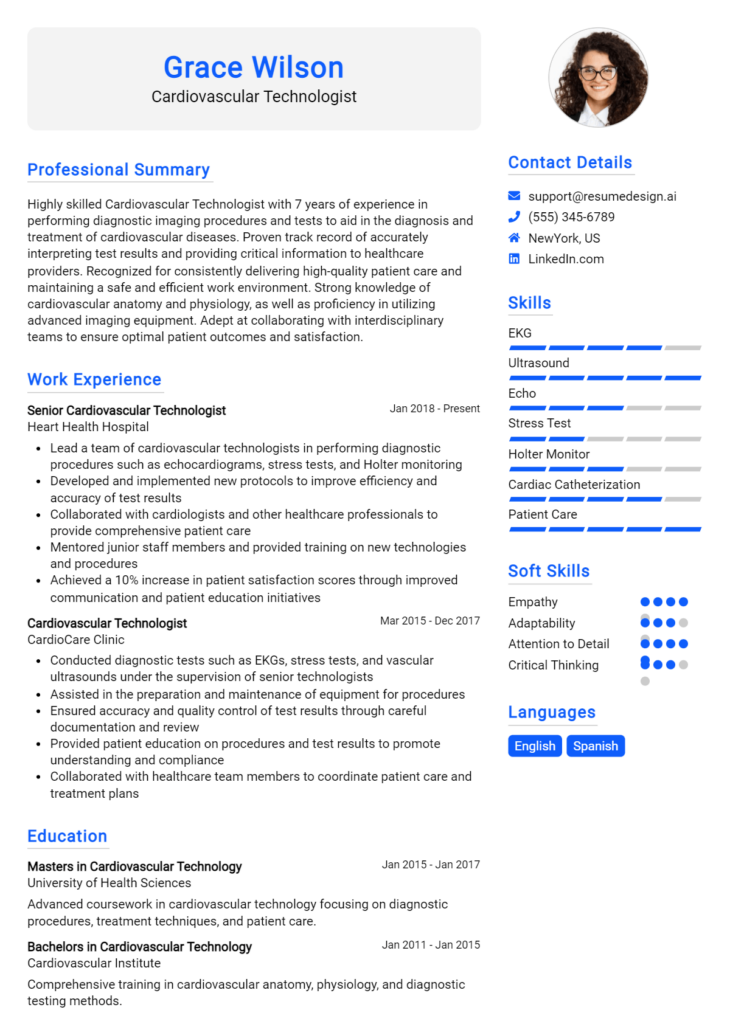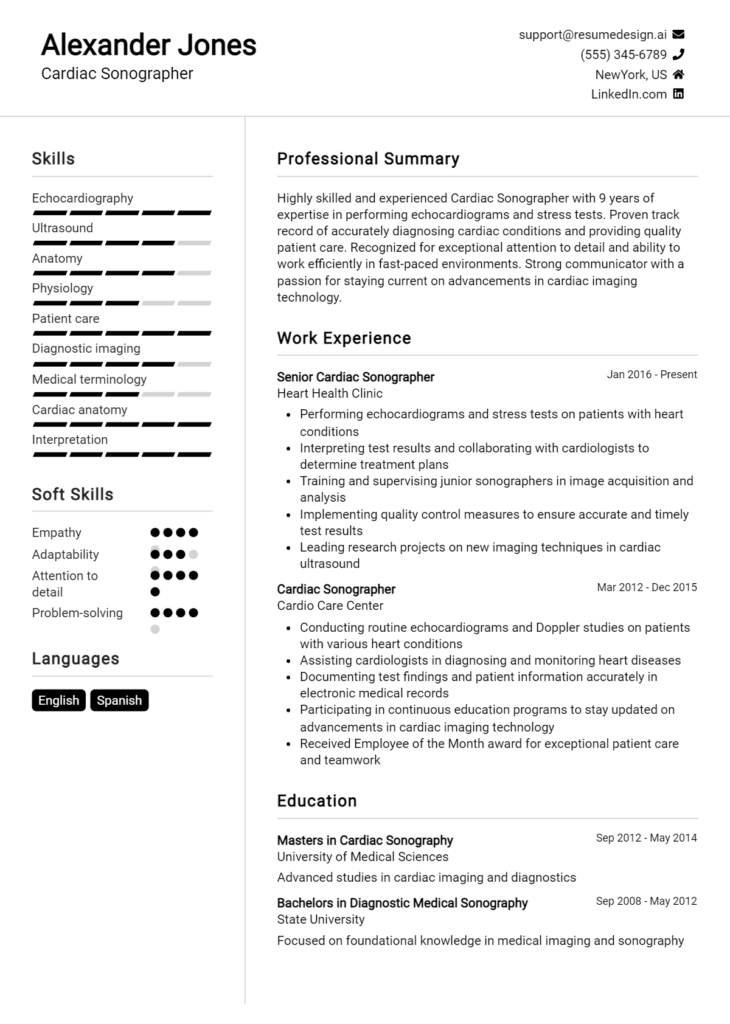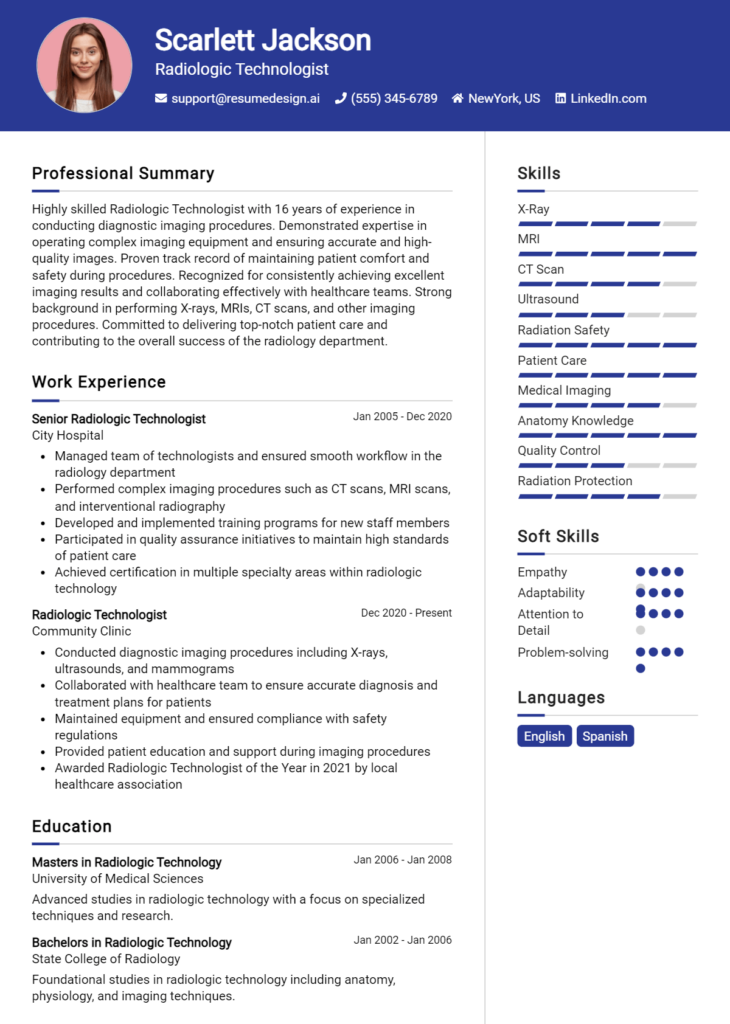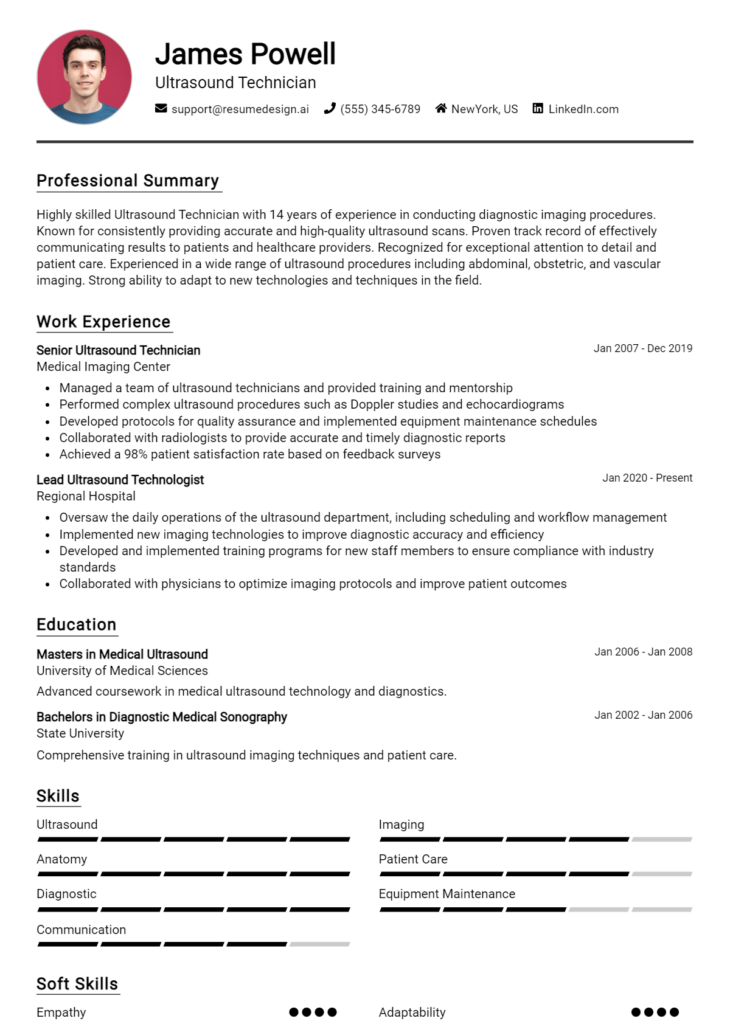Ophthalmic Technician Core Responsibilities
Ophthalmic Technicians play a vital role in the healthcare system by supporting ophthalmologists in various clinical tasks. Key responsibilities include conducting eye exams, assisting with diagnostic tests, and managing patient records. This role requires strong technical skills, operational efficiency, and problem-solving abilities to ensure seamless patient care and communication between departments. A well-crafted resume that emphasizes these qualifications not only showcases the technician's expertise but also aligns with the organization’s goals for high-quality eye care.
Common Responsibilities Listed on Ophthalmic Technician Resume
- Perform preliminary eye assessments and gather patient medical history.
- Administer diagnostic tests such as visual field testing and tonometry.
- Assist ophthalmologists during examinations and surgical procedures.
- Maintain and calibrate ophthalmic equipment for optimal performance.
- Educate patients on eye health and postoperative care.
- Document and update patient records accurately.
- Schedule appointments and manage patient flow efficiently.
- Collaborate with healthcare professionals to ensure comprehensive patient care.
- Handle billing and insurance paperwork related to ophthalmic services.
- Stay updated with advancements in ophthalmic technology and practices.
- Provide exceptional customer service and patient support.
High-Level Resume Tips for Ophthalmic Technician Professionals
In the competitive field of ophthalmology, a well-crafted resume serves as a crucial tool for Ophthalmic Technician professionals to make a strong first impression on potential employers. Your resume not only showcases your skills and achievements but also reflects your commitment to the profession. It needs to capture the attention of hiring managers quickly, emphasizing your unique qualifications and experiences relevant to the role. This guide aims to provide practical and actionable resume tips specifically tailored for Ophthalmic Technician professionals, ensuring you stand out in a crowded job market.
Top Resume Tips for Ophthalmic Technician Professionals
- Tailor your resume to the specific job description by incorporating relevant keywords and phrases that align with the employer's needs.
- Showcase your relevant experience in ophthalmic procedures, patient care, and equipment handling to demonstrate your expertise.
- Quantify your achievements by using numbers, such as the number of patients you assisted or specific improvements made in patient outcomes.
- Highlight industry-specific skills such as proficiency in using diagnostic equipment, knowledge of ocular anatomy, and familiarity with electronic health records.
- Include certifications and licenses that are relevant to the role, such as Certified Ophthalmic Technician (COT) or Certified Ophthalmic Assistant (COA).
- Use a clean, professional format with clear headings and bullet points to enhance readability and make key information easily accessible.
- Incorporate a summary statement at the top of your resume that succinctly outlines your qualifications and career goals.
- Focus on continuous learning and professional development by mentioning workshops, seminars, or additional training relevant to ophthalmic technology.
- Ensure that your contact information is up-to-date and easy to find, including your LinkedIn profile if applicable.
By implementing these tips, Ophthalmic Technician professionals can significantly enhance their resumes, increasing their chances of landing a desirable position in the field. A resume that effectively highlights skills, experiences, and achievements tailored to the job can make all the difference in catching the eye of potential employers and securing an interview opportunity.
Why Resume Headlines & Titles are Important for Ophthalmic Technician
In the competitive field of ophthalmic technology, a well-crafted resume headline or title serves as the first impression a candidate makes on hiring managers. This crucial component of a resume succinctly encapsulates a candidate's key qualifications, allowing them to stand out in a crowded applicant pool. A strong headline can immediately grab attention, summarizing essential skills and experiences in a concise, impactful phrase that is directly relevant to the position. It is important for candidates to ensure that their headlines reflect their expertise and align with the job they are applying for, setting the stage for a compelling resume that showcases their potential contributions to the organization.
Best Practices for Crafting Resume Headlines for Ophthalmic Technician
- Keep it concise—aim for one impactful phrase that summarizes your qualifications.
- Use role-specific keywords that align with the job description.
- Highlight your most relevant skills and experiences in the headline.
- Make it action-oriented to convey a sense of initiative and capability.
- Tailor your headline for each application to reflect the specific requirements of the position.
- Avoid jargon unless it is commonly understood in the field of ophthalmology.
- Focus on your unique selling points that differentiate you from other candidates.
- Ensure correct spelling and grammar for a professional presentation.
Example Resume Headlines for Ophthalmic Technician
Strong Resume Headlines
Certified Ophthalmic Technician with 5+ Years of Experience in Patient Care
Detail-oriented Ophthalmic Technician specializing in Visual Field Testing and OCT Imaging
Dedicated Ophthalmic Technician with Proven Track Record in Assisting Surgeons in Cataract Procedures
Compassionate and Skilled Ophthalmic Technician Committed to Enhancing Patient Experience
Weak Resume Headlines
Ophthalmic Technician Looking for a Job
Experienced Worker in Healthcare
Technician Seeking Opportunities
The strong headlines are effective because they are specific and highlight the candidate's unique qualifications, making it easy for hiring managers to quickly assess fit for the role. They convey a sense of professionalism and confidence, while also incorporating relevant keywords that align with the job description. In contrast, the weak headlines fail to make an impact due to their vagueness and lack of specificity. They do not convey the candidate's strengths or unique skills, ultimately making it difficult for hiring managers to see the value the candidate would bring to the position.
Writing an Exceptional Ophthalmic Technician Resume Summary
A resume summary is a crucial component for an Ophthalmic Technician's job application, as it serves as a powerful first impression to hiring managers. A well-crafted summary quickly captures attention by highlighting key skills, relevant experience, and noteworthy accomplishments that align with the specific job role. With the limited time hiring managers have to sift through numerous applications, a strong summary that is concise, impactful, and tailored to the position can significantly enhance a candidate's chances of being noticed and invited for an interview.
Best Practices for Writing a Ophthalmic Technician Resume Summary
- Quantify Achievements: Use numbers and percentages to demonstrate your impact in previous roles.
- Focus on Skills: Highlight both technical and soft skills that are relevant to the Ophthalmic Technician position.
- Tailor the Summary: Customize your summary for each job application to reflect the specific requirements listed in the job description.
- Be Concise: Keep your summary brief, ideally 2-4 sentences, to maintain the reader's interest.
- Use Action Words: Incorporate strong action verbs to convey your accomplishments and contributions effectively.
- Showcase Certifications: Mention relevant certifications or training that enhance your qualifications for the role.
- Highlight Patient Interaction: If applicable, emphasize your experience with patient care and communication skills.
- Reflect Industry Knowledge: Demonstrate your understanding of the ophthalmology field and its standards.
Example Ophthalmic Technician Resume Summaries
Strong Resume Summaries
Dedicated Ophthalmic Technician with over 5 years of experience in performing diagnostic tests and assisting in surgical procedures. Proven track record of increasing patient satisfaction ratings by 30% through effective communication and compassionate care.
Detail-oriented Ophthalmic Technician skilled in OCT, visual field testing, and patient education. Successfully reduced patient wait times by 25% through efficient management of clinic workflows, contributing to overall operational improvements.
Certified Ophthalmic Technician with expertise in retinal imaging and a passion for patient care. Achieved a 95% accuracy rate in diagnostic testing, significantly enhancing treatment outcomes for over 200 patients annually.
Weak Resume Summaries
Ophthalmic Technician with some experience in the field. I have worked with patients and know how to use various equipment.
Looking for a job as an Ophthalmic Technician. I am a hard worker and can do many things related to eye care.
The strong resume summaries stand out because they include quantifiable results, highlight specific skills relevant to the Ophthalmic Technician role, and provide a clear picture of the candidate's capabilities and accomplishments. In contrast, the weak summaries lack detail, are vague, and do not convey any concrete achievements, making them less appealing to potential employers.
Work Experience Section for Ophthalmic Technician Resume
The work experience section of an Ophthalmic Technician resume is vital in demonstrating a candidate's technical proficiency and practical application of skills in a clinical setting. This section not only reflects the candidate's hands-on experience with ophthalmic instruments and procedures but also showcases their ability to manage teams, collaborate effectively, and deliver high-quality patient care. By quantifying achievements and aligning their experience with industry standards, candidates can effectively illustrate their value to potential employers, making this section a critical component of their resume.
Best Practices for Ophthalmic Technician Work Experience
- Highlight specific technical skills related to ophthalmic equipment and procedures.
- Quantify achievements, such as the number of patients treated or improvements in patient satisfaction scores.
- Emphasize collaboration with ophthalmologists and other healthcare professionals.
- Detail any leadership roles or responsibilities in managing team workflows.
- Include relevant certifications and ongoing education to showcase commitment to the field.
- Utilize action verbs to convey a strong sense of initiative and accomplishment.
- Tailor your experience to match the job description and industry standards.
- Showcase any contributions to process improvements or innovations in patient care.
Example Work Experiences for Ophthalmic Technician
Strong Experiences
- Performed pre-operative assessments for over 500 patients, resulting in a 30% reduction in surgical cancellations.
- Led a team of 5 technicians in implementing a new electronic health record system, improving workflow efficiency by 25%.
- Trained and mentored junior technicians, enhancing team performance and patient care quality, as evidenced by a 15-point increase in patient satisfaction ratings.
- Conducted comprehensive visual field tests, achieving a 99% accuracy rate in detecting glaucoma in patients.
Weak Experiences
- Assisted in patient care tasks as needed.
- Worked with various ophthalmic equipment.
- Helped out with administrative duties in the clinic.
- Provided support to the ophthalmologist during procedures.
The examples of strong experiences are considered effective because they provide specific, quantifiable outcomes that demonstrate the candidate's impact on patient care and operational efficiency. They also convey leadership and collaboration, showcasing the candidate's ability to work well within a team. In contrast, the weak experiences lack detail and substance, failing to highlight any significant contributions or measurable results, which diminishes their value in portraying the candidate's qualifications.
Education and Certifications Section for Ophthalmic Technician Resume
The education and certifications section of an Ophthalmic Technician resume is crucial as it serves as a testament to the candidate's academic foundation, specialized training, and commitment to ongoing education in the field. This section not only showcases relevant degrees and certifications but also highlights the candidate’s dedication to continuous learning and professional development. By detailing relevant coursework, certifications, and specialized training, candidates can significantly enhance their credibility and demonstrate alignment with the specific requirements of the job role, thereby increasing their chances of securing an interview and advancing their career.
Best Practices for Ophthalmic Technician Education and Certifications
- Include degrees from accredited institutions, emphasizing any programs specifically related to ophthalmic technology.
- List industry-recognized certifications, such as the Certified Ophthalmic Technician (COT) or Certified Ophthalmic Assistant (COA).
- Highlight relevant coursework that demonstrates specialized knowledge in areas like anatomy, optics, or patient care.
- Detail any continuing education courses or workshops that keep your skills current with industry advancements.
- Use clear headings and bullet points for easy readability and quick reference by hiring managers.
- Consider including any honors or distinctions received during your educational journey.
- Align your education and certifications with the job description to show direct relevance to the position applied for.
- Regularly update this section to reflect any new qualifications or training acquired.
Example Education and Certifications for Ophthalmic Technician
Strong Examples
- Associate Degree in Ophthalmic Technology, XYZ Community College, 2022
- Certified Ophthalmic Technician (COT), Joint Commission on Allied Health Personnel in Ophthalmology, 2023
- Completed coursework in Ocular Anatomy and Patient Care Techniques, ABC University
- Fundamentals of Visual Optics Certification, 2023
Weak Examples
- Bachelor's Degree in Business Administration, DEF University, 2020
- Certification in Basic Life Support (BLS), 2018 (not specific to ophthalmology)
- High School Diploma, GHI High School, 2015 (no further education listed)
- Outdated certification in Eye Care Management, 2015
The strong examples are considered effective because they are directly relevant to the role of an Ophthalmic Technician, demonstrating specialized knowledge and recognized credentials that align with industry standards. In contrast, the weak examples lack relevance to the ophthalmic field or reflect outdated or unrelated qualifications, which do not contribute to the candidate's suitability for the position.
Top Skills & Keywords for Ophthalmic Technician Resume
As an Ophthalmic Technician, having a well-crafted resume that highlights your skills is crucial in showcasing your qualifications to potential employers. The right combination of soft and hard skills can set you apart from other candidates and demonstrate your ability to perform effectively in a clinical setting. Soft skills such as communication and empathy are essential for building rapport with patients, while hard skills like proficiency in diagnostic equipment are vital for delivering high-quality care. By emphasizing these skills in your resume, you can present yourself as a competent and compassionate professional ready to contribute to an ophthalmology practice.
Top Hard & Soft Skills for Ophthalmic Technician
Soft Skills
- Strong communication skills
- Empathy and compassion
- Attention to detail
- Time management
- Problem-solving abilities
- Team collaboration
- Adaptability
- Patient education
- Organizational skills
- Customer service orientation
Hard Skills
- Proficiency in ocular diagnostic equipment
- Knowledge of ophthalmic terminology
- Ability to perform visual field tests
- Experience with retinal imaging
- Familiarity with electronic health records (EHR)
- Skills in contact lens fitting
- Understanding of refractive error assessments
- Ability to assist in minor surgical procedures
- Knowledge of infection control protocols
- Competence in performing tonometry and pachymetry
By ensuring that your resume includes these essential skills, along with relevant work experience, you can effectively demonstrate your qualifications and readiness for the role of an Ophthalmic Technician.
Stand Out with a Winning Ophthalmic Technician Cover Letter
Dear [Hiring Manager's Name],
I am writing to express my interest in the Ophthalmic Technician position at [Company Name], as advertised on [where you found the job listing]. With my extensive training in ophthalmic procedures, patient care, and a strong commitment to improving patient outcomes, I am confident in my ability to contribute effectively to your team. My background in performing diagnostic tests, assisting with procedures, and providing exceptional patient support aligns perfectly with the needs of your practice.
Throughout my [number] years of experience in the ophthalmology field, I have honed my skills in various diagnostic equipment, such as OCT, visual field analyzers, and autorefractors. I pride myself on my ability to ensure that patients feel comfortable and informed during their visits. By effectively communicating complex information in an easy-to-understand manner, I help alleviate any anxiety they may have regarding their eye health. Additionally, my attention to detail enables me to accurately record patient histories and test results, which I believe is crucial for successful patient care.
I am particularly drawn to the mission of [Company Name] to provide comprehensive eye care and foster a patient-centered environment. I share the same passion for delivering high-quality care and am eager to bring my skills in assisting ophthalmologists, managing patient flow, and maintaining equipment to your esteemed practice. I am excited about the opportunity to work alongside a dedicated team of professionals who prioritize patient satisfaction and innovative eye care solutions.
Thank you for considering my application. I look forward to the opportunity to discuss how my background, skills, and enthusiasm can contribute to the continued success of [Company Name]. Please feel free to contact me at [your phone number] or [your email] to arrange a convenient time for an interview.
Sincerely,
[Your Name]
Common Mistakes to Avoid in a Ophthalmic Technician Resume
When crafting a resume for the role of an Ophthalmic Technician, it’s crucial to present your skills and experiences effectively. However, many candidates make common mistakes that can hinder their chances of landing an interview. By avoiding these pitfalls, you can enhance your resume and highlight your qualifications more clearly. Here are some common mistakes to steer clear of:
Lack of Specificity: Using vague terms instead of specific details about your experience can make your resume less impactful. Instead of saying "assisted in eye exams," specify the types of exams and your exact role.
Ignoring Keywords: Failing to incorporate relevant keywords from the job description can result in your resume being filtered out by applicant tracking systems. Make sure to include terms like "ophthalmic imaging," "patient care," or "visual field testing."
Inconsistent Formatting: A cluttered or inconsistent resume layout can be distracting. Use a uniform font, size, and bullet style throughout to maintain professionalism.
Overloading with Jargon: While it’s important to demonstrate your knowledge of ophthalmology, excessive technical jargon can alienate hiring managers. Balance technical terms with clear explanations that showcase your skills.
Neglecting Soft Skills: Many resumes focus exclusively on technical skills, neglecting the importance of soft skills like communication and empathy, which are vital in patient interactions. Highlight these skills alongside your technical abilities.
Omitting Relevant Certifications: Forgetting to list relevant certifications, such as Certified Ophthalmic Technician (COT) or other specialized training, can diminish your qualifications. Always include certifications prominently.
Using an Objective Statement: Instead of a generic objective statement, which can be outdated, consider using a professional summary that highlights your experience and what you bring to the role.
Failing to Quantify Achievements: Instead of simply listing duties, quantify your achievements with metrics or outcomes, such as "improved patient satisfaction scores by 20% through effective communication," to demonstrate the impact of your work.
By avoiding these common mistakes, you can create a compelling resume that effectively communicates your qualifications as an Ophthalmic Technician and enhances your chances of securing an interview.
Conclusion
As an Ophthalmic Technician, you play a crucial role in assisting ophthalmologists in providing top-notch patient care. From performing preliminary eye exams to managing patient records and maintaining equipment, your skills are essential in ensuring accurate diagnoses and effective treatment plans.
In this article, we covered the essential responsibilities and skills required for the role, including proficiency in using diagnostic equipment, understanding ocular anatomy, and effective communication with patients to provide comfort and clarity during examinations. We also discussed the importance of continuous education and staying updated with the latest advancements in ophthalmic technology.
Now that you're equipped with valuable insights about the Ophthalmic Technician role, it's time to ensure your resume showcases your expertise and aligns with industry standards. Take a moment to review and enhance your Ophthalmic Technician resume. Utilize tools like resume templates, which provide a solid foundation for your design, or try our resume builder for a personalized touch. If you're looking for inspiration, check out our resume examples to see how others in your field present their qualifications. Additionally, don’t forget the importance of a strong introduction; use our cover letter templates to make a great first impression.
Take action today to ensure your resume stands out in the competitive field of ophthalmology!

